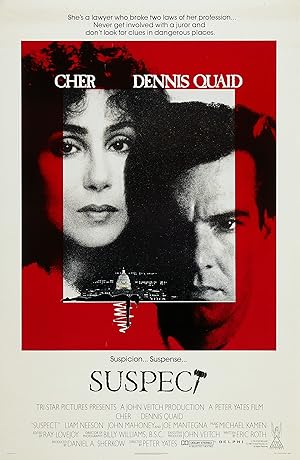
Suspect Page #6
- R
- Year:
- 1987
- 121 min
- 690 Views
who's probably guilty.
Guilty.
It's not that complicated.
He needed the money,
so he killed a woman.
- What about Michael's murder?
- Another sick bastard.
- What about the files?
- It's all bullshit!
I'm tired, okay?
I want you to go. Now.
Good night.
Ladies and gentlemen,
it's my responsibility to ensure -
- that these proceedings maintain
the highest standards of integrity.
There is the possibility that
these standards are being compromised.
To ensure this doesn't happen, -
- I will sequester the jury
for the remainder of this trial.
I remind you of your solemn oath
to remain impartial,-
to weigh the evidence, -
- and independently to render
a verdict of your conscience.
You will be made
as comfortable as possible, -
- and I thank you
for your perseverance.
Counsel, I expect you both to be
models of propriety in this proceeding.
The defense calls
Carl Wayne Anderson.
Remove Mr. Anderson's handcuffs.
Mr. Anderson's hands can be free
while he testifies.
Thank you, Your Honor.
Do you swear to tell the whole truth
and nothing but the truth?
For the record,
the witness indicated his assent.
You may be seated.
Please state your full name
and address.
"Carl -
Wayne -
Anderson. "
Your address?
"None. "
- We need a home address, Your Honor.
- Make it in care of me.
Without objection.
Mr. Anderson
Have you ever killed anyone?
- "Yes. "
- Why?
- "I'm not sure "
- You're not sure why?
"I was in Vietnam. I was nineteen. "
So you were a soldier. It was your job
to kill. You didn't need a reason.
Do you think you needed a reason?
"Yes. "
In fact, it upset you so much
that you had a breakdown.
You were discharged from the army
and spent six years in a hospital.
All because you were a good soldier
Carl, what were your dreams?
When you were young,
what did you want to be?
"A carpenter.
And build my own house. "
Were you ever in love?
"I loved Caroline. "
Who was Caroline?
"My wife. "
Did you and Caroline
plan to have children?
- And what happened?
- "We were divorced. "
- Why?
"After the sickness,
I had nothing left -
to offer her. "
It's been rough.
You've had your share of problems.
You've been kicked around pretty good.
Are we supposed to
feel sorry for you?
Plenty of people have problems.
Plenty of people get kicked around.
You know the difference
between you and them?
They still have their dignity.
They don't sleep in the gutter
or eat out of garbage cans.
They don't urinate
on people's lawns.
They shower and change their clothes.
They don't feel sorry for themselves.
They get married, they have children.
They take responsibility.
They don't sleep in other people's cars
or steal nine dollars from anyone!
Did you kill Elizabeth Rose Quinn?
Your witness.
That was a wonderful performance.
The man shouldn't be on trial,
You were discharged from the army
for psychiatric reasons?
"Yes. "
Did you beat an officer with a shovel
because he asked you to dig a trench?
- "Yes. "
- Violence seems to follow you around.
- Objection, Your Honor.
- Sustained.
Were you arrested in 1978
for assaulting a congressional aide?
"Yes. "
And were you in jail for six months
for beating a man?
"He stole my shoes. "
Did you punch your attorney
in the face
- Objection! That's privileged.
- I'll withdraw the question.
You were in the parking lot on K Street
"Yes. "
And you did break into
Elizabeth Quinn's car?
- "It was cold. "
- Just yes or no, please.
- Your counsel has explained enough.
- Objection, Your Honor.
Could we proceed?
Did the parking-lot attendant
throw you off the lot?
"Yes. "
But you came back
just before midnight?
"Yes. "
And you attacked Elizabeth Quinn
and dragged her down to the river?
"Nu. -
You were at the Potomac River
after midnight, weren't you?
- "I was looking for wood. "
- Just yes or no, please.
"Yes. "
Elizabeth was there.
You were there.
Her purse was stolen.
You had her purse.
Her throat was cut. You had a knife.
Those are the naked facts!
Objection.
Would Mr. Stella wait till the end of
the trial to make his closing argument?
Sustained.
Miss Riley has the gift of speech.
I'll let the facts
speak for themselves.
How did you expect us to believe
you didn't kill her?
No further questions at this time,
Your Honor.
- What do you think you're doing?
- I was her friend.
- Miss Riley.
- I'm sorry to bother you at home.
That's perfectly all right,
although highly irregular.
I know, but I have evidence, that will
at least necessitate a mistrial.
Excuse me, Matthew.
May I use your phone?
Deputy Attorney General Paul Gray,
Miss Kathleen Riley.
Miss Riley is the public defender
in the Elizabeth Quinn trial.
Miss Quinn worked for me. I've been
following the trial with interest.
Miss Riley feels she has evidence
which will exculpate her client.
- The phone?
- There's one in the study.
Don't bother, Matthew.
Nice to meet you, Miss Riley.
What is this evidence?
Your Honor, I've behaved rashly.
I should present the evidence
properly in court.
- This is somewhat erratic, isn't it?
- Sorry, I'm under tremendous strain.
professional misconduct, Miss Riley.
Matthew?
There's a problem I have to take
care of. Thanks for a lovely evening.
- Let me show you out.
- Oh, don't bother.
This is Justice Charles F. Lowell.
For twenty years
I've lived with this burden, -
- always expecting exposure from a law
student, a legal scholar, a colleague.
Elizabeth Rose Quinn,
a clerk at the Justice Department, -
- recognized the injustice
of the decision -
- in United States vs Cook
and came to me.
More than the fear of exposure,
I've had to live with myself.
for ambition.
In 1968,
while I was the presiding judge -
- on the case of United States
vs Cook in the federal court, -
- I conspired to fix the case.
I accepted a bribe.
In exchange for a seat on
the United States Circuit Court -
- I dismissed charges of vote fraud
against an influential defendant.
Miss Quinn has contacted
the others that were involved.
I leave them to their consciences.
I will make my peace
somewhere else.
I have asked Elizabeth Quinn
to make this public after my death.
This is my last small measure
of justice.
To fix a case, you need a judge
who's willing to go along.
You need a very influential defendant,
and a corrupt prosecutor.
United States vs Cook.
That must be a case I didn't get to.
But I'll bet that Paul Gray
was the prosecuting attorney.
You're accusing the Deputy Attorney
General of the United States of murder.
I had the federal supplement in here.
I must have left it at the courthouse.
What's going on?
Is this the Public Defenders' Office?
Translation
Translate and read this script in other languages:
Select another language:
- - Select -
- 简体中文 (Chinese - Simplified)
- 繁體中文 (Chinese - Traditional)
- Español (Spanish)
- Esperanto (Esperanto)
- 日本語 (Japanese)
- Português (Portuguese)
- Deutsch (German)
- العربية (Arabic)
- Français (French)
- Русский (Russian)
- ಕನ್ನಡ (Kannada)
- 한국어 (Korean)
- עברית (Hebrew)
- Gaeilge (Irish)
- Українська (Ukrainian)
- اردو (Urdu)
- Magyar (Hungarian)
- मानक हिन्दी (Hindi)
- Indonesia (Indonesian)
- Italiano (Italian)
- தமிழ் (Tamil)
- Türkçe (Turkish)
- తెలుగు (Telugu)
- ภาษาไทย (Thai)
- Tiếng Việt (Vietnamese)
- Čeština (Czech)
- Polski (Polish)
- Bahasa Indonesia (Indonesian)
- Românește (Romanian)
- Nederlands (Dutch)
- Ελληνικά (Greek)
- Latinum (Latin)
- Svenska (Swedish)
- Dansk (Danish)
- Suomi (Finnish)
- فارسی (Persian)
- ייִדיש (Yiddish)
- հայերեն (Armenian)
- Norsk (Norwegian)
- English (English)
Citation
Use the citation below to add this screenplay to your bibliography:
Style:MLAChicagoAPA
"Suspect" Scripts.com. STANDS4 LLC, 2025. Web. 6 Mar. 2025. <https://www.scripts.com/script/suspect_19194>.







Discuss this script with the community:
Report Comment
We're doing our best to make sure our content is useful, accurate and safe.
If by any chance you spot an inappropriate comment while navigating through our website please use this form to let us know, and we'll take care of it shortly.
Attachment
You need to be logged in to favorite.
Log In